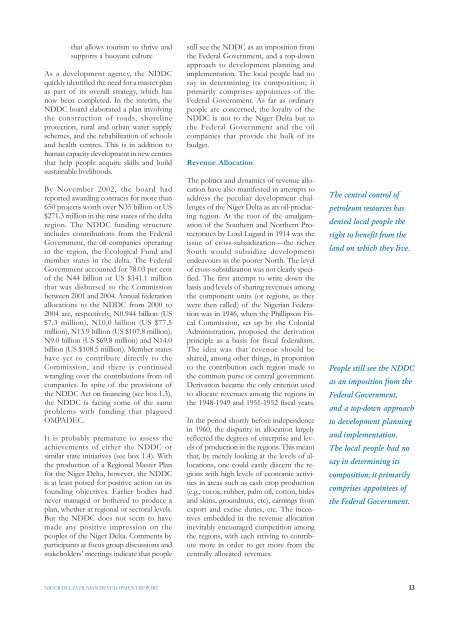Niger Delta Human Development Report - UNDP Nigeria - United ...
Niger Delta Human Development Report - UNDP Nigeria - United ...
Niger Delta Human Development Report - UNDP Nigeria - United ...
Create successful ePaper yourself
Turn your PDF publications into a flip-book with our unique Google optimized e-Paper software.
that allows tourism to thrive and<br />
supports a buoyant culture<br />
As a development agency, the NDDC<br />
quickly identified the need for a master plan<br />
as part of its overall strategy, which has<br />
now been completed. In the interim, the<br />
NDDC board elaborated a plan involving<br />
the construction of roads, shoreline<br />
protection, rural and urban water supply<br />
schemes, and the rehabilitation of schools<br />
and health centres. This is in addition to<br />
human capacity development in new centres<br />
that help people acquire skills and build<br />
sustainable livelihoods.<br />
By November 2002, the board had<br />
reported awarding contracts for more than<br />
650 projects worth over N35 billion or US<br />
$271.3 million in the nine states of the delta<br />
region. The NDDC funding structure<br />
includes contributions from the Federal<br />
Government, the oil companies operating<br />
in the region, the Ecological Fund and<br />
member states in the delta. The Federal<br />
Government accounted for 78.03 per cent<br />
of the N44 billion or US $341.1 million<br />
that was disbursed to the Commission<br />
between 2001 and 2004. Annual federation<br />
allocations to the NDDC from 2000 to<br />
2004 are, respectively, N0.944 billion (US<br />
$7.3 million), N10.0 billion (US $77.5<br />
million), N13.9 billion (US $107.8 million),<br />
N9.0 billion (US $69.8 million) and N14.0<br />
billion (US $108.5 million). Member states<br />
have yet to contribute directly to the<br />
Commission, and there is continued<br />
wrangling over the contributions from oil<br />
companies. In spite of the provisions of<br />
the NDDC Act on financing (see box 1.3),<br />
the NDDC is facing some of the same<br />
problems with funding that plagued<br />
OMPADEC.<br />
It is probably premature to assess the<br />
achievements of either the NDDC or<br />
similar state initiatives (see box 1.4). With<br />
the production of a Regional Master Plan<br />
for the <strong>Niger</strong> <strong>Delta</strong>, however, the NDDC<br />
is at least poised for positive action on its<br />
founding objectives. Earlier bodies had<br />
never managed or bothered to produce a<br />
plan, whether at regional or sectoral levels.<br />
But the NDDC does not seem to have<br />
made any positive impression on the<br />
peoples of the <strong>Niger</strong> <strong>Delta</strong>. Comments by<br />
participants at focus group discussions and<br />
stakeholders’ meetings indicate that people<br />
NIGER DELTA HUMAN DEVELOPMENT REPORT<br />
still see the NDDC as an imposition from<br />
the Federal Government, and a top-down<br />
approach to development planning and<br />
implementation. The local people had no<br />
say in determining its composition; it<br />
primarily comprises appointees of the<br />
Federal Government. As far as ordinary<br />
people are concerned, the loyalty of the<br />
NDDC is not to the <strong>Niger</strong> <strong>Delta</strong> but to<br />
the Federal Government and the oil<br />
companies that provide the bulk of its<br />
budget.<br />
Revenue Allocation<br />
The politics and dynamics of revenue allocation<br />
have also manifested in attempts to<br />
address the peculiar development challenges<br />
of the <strong>Niger</strong> <strong>Delta</strong> as an oil-producing<br />
region. At the root of the amalgamation<br />
of the Southern and Northern Protectorates<br />
by Lord Lugard in 1914 was the<br />
issue of cross-subsidization—the richer<br />
South would subsidize development<br />
endeavours in the poorer North. The level<br />
of cross-subsidization was not clearly specified.<br />
The first attempt to write down the<br />
basis and levels of sharing revenues among<br />
the component units (or regions, as they<br />
were then called) of the <strong>Niger</strong>ian Federation<br />
was in 1946, when the Phillipson Fiscal<br />
Commission, set up by the Colonial<br />
Administration, proposed the derivation<br />
principle as a basis for fiscal federalism.<br />
The idea was that revenue should be<br />
shared, among other things, in proportion<br />
to the contribution each region made to<br />
the common purse or central government.<br />
Derivation became the only criterion used<br />
to allocate revenues among the regions in<br />
the 1948-1949 and 1951-1952 fiscal years.<br />
In the period shortly before independence<br />
in 1960, the disparity in allocation largely<br />
reflected the degrees of enterprise and levels<br />
of production in the regions. This meant<br />
that, by merely looking at the levels of allocations,<br />
one could easily discern the regions<br />
with high levels of economic activities<br />
in areas such as cash crop production<br />
(e.g., cocoa, rubber, palm oil, cotton, hides<br />
and skins, groundnuts, etc), earnings from<br />
export and excise duties, etc. The incentives<br />
embedded in the revenue allocation<br />
inevitably encouraged competition among<br />
the regions, with each striving to contribute<br />
more in order to get more from the<br />
centrally allocated revenues.<br />
The central control of<br />
petroleum resources has<br />
denied local people the<br />
right to benefit from the<br />
land on which they live.<br />
People still see the NDDC<br />
as an imposition from the<br />
Federal Government,<br />
and a top-down approach<br />
to development planning<br />
and implementation.<br />
The local people had no<br />
say in determining its<br />
composition; it primarily<br />
comprises appointees of<br />
the Federal Government.<br />
13










